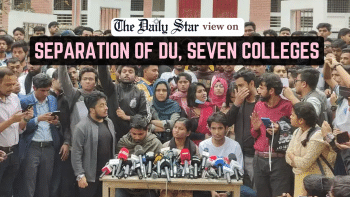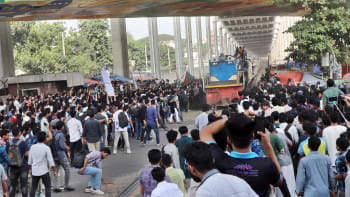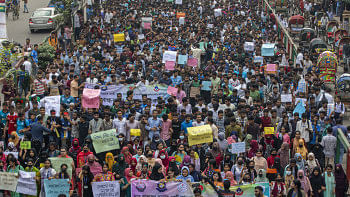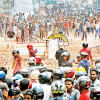Why the seven colleges want out of Dhaka University

I was on deputation when the seven colleges were annexed to my parent institution. After completing a stint at a private university, I returned to Dhaka University and was soon assigned the additional duty of chairing the MA in English Committee for the seven colleges. My responsibilities remained largely fixed: inviting and moderating questions, selecting examiners, sending a DU representative to the oral examination, and compiling and publishing results. All examiners were from the respective colleges. I convened meetings and learnt that there were no meeting allowances. As the committee chair, it was up to me to entertain our guest colleagues.
During moderation, it was apparent that both internal and external examiners were setting basic questions with little variation. There was not much to moderate, as those were probably the only topics taught in class—raising the difficulty level would cause public furore.
Without knowing what had actually been taught in class, we refrained from being too creative with the question pattern. After the written exam, I went to conduct an oral examination at one of the colleges. While four or five students out of 100 were really good, most had no clue. "Sir, if we fail them, it will be difficult to leave the compound with your car intact." "But how will they know they've failed?" "They will know." "So what do you suggest?" "I can guarantee you they will fail in their written exams. There is no point in failing them in viva." I succumbed to such logic and signed my bill.
I recalled that in the 2018-19 session, only one student out of 100 in the English department at Kabi Nazrul Government College, and two out of 98 at Government Shaheed Suhrawardy College, passed the exams. The pass percentage in other departments stood at 21 percent.
One student said only a quarter of the syllabus was taught by their teachers, leading to this fiasco. Why don't the teachers take classes? Most of them, recruited through BCS examinations, have to deal with higher secondary, BA (pass and honours), and MA students. Their workload is insane. According to college websites, Dhaka College has 220 teachers for 25,000 students; Government Titumir College has 225 for 35,000; Kabi Nazrul Government College has 110 for 21,000; and Government Bangla College has 155 for 13,000. No public information is available on the number of teachers at the two female colleges. I reckon that across these seven colleges, there is approximately one teacher for every 130-plus students. The prescribed ratio followed by most top public and private universities is 1:15. Only Eden Mohila College mentions having an academic journal.
It is no wonder that the students of these colleges—Government Titumir College, Dhaka College, Eden Mohila College, Begum Badrunnesa Government Girls' College, Government Bangla College, Kabi Nazrul Government College, and Government Shaheed Suhrawardy College—are disenchanted with their over-hyped affiliation with Dhaka University since 2017. In the last seven-plus years, we have failed to bring in any substantial changes to these institutions. Administrative delays, session backlogs, exam postponements, and result disasters have led to the students to demand a university of their own. Their protests turned violent, and last Monday, DU's top administration met the college principals and agreed to sever ties. Now, the University Grants Commission (UGC) is considering a new public university named "July 36 University" for these colleges.
Critics are cynical about such cosmetic changes. They feel that turning the colleges into a university in name only, without substantial infrastructural and administrative improvements, could lead to quality concerns. Degrees might not be recognised if the new university fails to meet established standards. More importantly, caving in to student activism may encourage all such colleges with postgraduate programmes to demand similar upgrades, straining national resources and diluting academic standards.
You can't just say, "Let there be a university, and there was a university." It took nearly 15 years for different commissions to prepare the charter for Dhaka University in 1921. We hear the UGC was in the process of formulating potential options for these colleges. The abrupt decision to break away from DU surprised both the education adviser and the concerned UGC member alike. Both reminded DU that such an annulment cannot be decided in an impromptu meeting with college principals. The academic council needed to discuss the matter before the syndicate ratified it.
The press release issued by DU was a public-pleasing declaration that repeated the historical procedural mistake. When, in 2017, the then DU vice-chancellor agreed to take on the challenge of upgrading these seven National University colleges, it was not discussed at the academic council. And the government gazette notification was endorsed by the syndicate without input from stakeholders. Thus, the DU fraternity was not given the chance to register the fact that they lacked the capacity to handle 200,000 extra students without additional logistics and incentives.
Engagement remained half-hearted—some departments enjoyed the script-checking and newfound authority, while others maintained a casual link. Only four rooms and 50 staff members were allocated by DU for these tasks. In the process, the students suffered, resentment grew, and successive changes in DU VC-ship hampered the project further. To make matters worse, there were allegations of corruption, inefficiency, and misdemeanour. The central administration was levying overhead charges, which did not benefit the partnering departments. A detailed roadmap addressing infrastructure, faculty training, and curriculum development for seven colleges was never pursued. Students of these colleges were treated like foster kids, with their certificates emphasising their affiliation status—reminding employers of their second-class status.
Now, these colleges are fighting for their dignity. Titumir College has been particularly vocal, with students staging protests and hunger strikes demanding university status. Their actions reflect a strong desire for autonomy and better academic conditions. They believe an independent university would allow them to tailor curricula to better suit their needs.
However, establishing a new university requires significant investment. Is it possible for universities to have pre-university higher secondary programmes? What will happen to the teachers with transferable jobs? If their status is upgraded to university teachers, other civil servants might revolt. Does passing a single civil service exam qualify them for university teaching—especially when most lack research and pedagogy training? What will happen to incoming students who will not have an accredited programme due to this severance?
The issue is complex. Common sense demands that students rely on the model proposals being prepared by the UGC. The interim government has also hinted at budgetary constraints. This issue needs thorough discussion at the academic council. A postmortem of past failure can offer future solutions.
Dr Shamsad Mortuza is professor of English at Dhaka University.
Views expressed in this article are the author's own.
Follow The Daily Star Opinion on Facebook for the latest opinions, commentaries, and analyses by experts and professionals. To contribute your article or letter to The Daily Star Opinion, see our guidelines for submission.

 For all latest news, follow The Daily Star's Google News channel.
For all latest news, follow The Daily Star's Google News channel. 










Comments